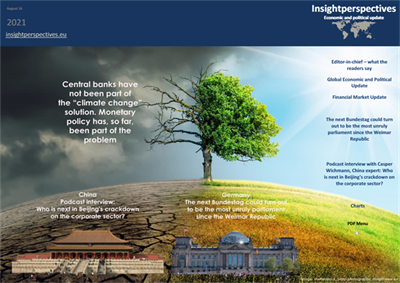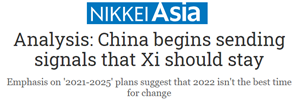
7. May 2024
Angriffe der Ukraine zeigen Wirkung: Russische Armee nutzt Krim-Brucke nicht mehr
7. May 2024
U.S. soldier detained in Russia and accused of stealing, officials say
7. May 2024
Journalists at Italian public media strike over Meloni government's influence
7. May 2024
China's Luckin Coffee Falls Into the Red as Competition Ramps Up
7. May 2024
Georgia: The next domino to fall in the Kremlin's undemocratic direction - POLITICO
7. May 2024
Germany partly to blame for Brexit, says CDU leader7. May 2024 - Articles
Germany's many obstacles: Fifth-column activities, Scholz and Christian Lindner stand in the way of voters who support change6. May 2024 - Articles
A short note on the US employment report and the ISM surveys: A paradigm shift6. May 2024 - Articles
The EU faces crucial days and months. The first test is the Xi Jinping visit. The next test: Ukraine's vulnerable eastern front?3. May 2024 - Articles
The US labour market will continue to hit its ceiling without massive increases in productivity2. May 2024 - Articles
Japan is a 'currency manipulator' - but no one has an interest in telling Tokyo [corrected]1. May 2024 - Articles
Western central banks face a reality check. Wage inflation will not go away without higher unemployment - but this requires significant tightening
 On Tuesday, President Xi Jinping launched a proposal, which puts China’s wealthiest citizens on high alert, by "offering an outline for common prosperity that includes income regulation and redistribution," according to Bloomberg. This shows that Beijing has turned more socialist, but, this time, with "real socialist [social-democratic] characteristics".
On Tuesday, President Xi Jinping launched a proposal, which puts China’s wealthiest citizens on high alert, by "offering an outline for common prosperity that includes income regulation and redistribution," according to Bloomberg. This shows that Beijing has turned more socialist, but, this time, with "real socialist [social-democratic] characteristics".  Generally speaking, Beijing is playing its cards much better than the United States and Europe. In fact, Beijing does not even have to play its card because Western powers are failing big time, unfortunately. Instead, China picks up the pieces. [Read the CNBC article, China may align itself with Taliban and try to exploit Afghanistan's rare earth metals: analyst.] Furthermore, soon, Europe will see the aftermath of the failure in Afghanistan in the form of hundred thousands of refugees.
Generally speaking, Beijing is playing its cards much better than the United States and Europe. In fact, Beijing does not even have to play its card because Western powers are failing big time, unfortunately. Instead, China picks up the pieces. [Read the CNBC article, China may align itself with Taliban and try to exploit Afghanistan's rare earth metals: analyst.] Furthermore, soon, Europe will see the aftermath of the failure in Afghanistan in the form of hundred thousands of refugees.